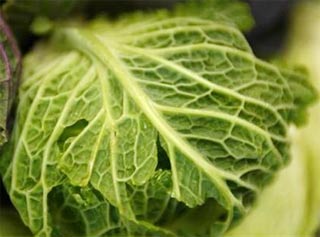Eating fruits and vegetables reduces the rate of cancer
Several other studies have shown that eating dark berries also reduces the rate of cancer - this proves an ongoing study: vegetables, especially colorful ones, can be reduced cancer rate.
Only 3 servings of fresh cauliflower or cabbage a month can reduce the incidence of bladder cancer to 40%.
275 people who had bladder cancer and 825 people without cancer were surveyed by the team at Roswell Park Cancer Institute in Buffalo, New York. They focus primarily on the group of people using cruciferous plants such as cauliflower and cabbage. These vegetables are rich in isothiocyanates, a compound that can reduce the risk of cancer.
The results for non-smokers are indeed impressive. The American Association of Cancer Research meeting will be organized by researchers during the week in Philadelphia. Compared to smokers who eat less than 3 servings of raw vegetables per month, 73% of non-smokers who eat at least 3 servings are less likely to be in the bladder cancer group.

Eating fruits and vegetables reduces the rate of cancer
(Photo: Reuters)
For both smokers and non-smokers, people who ate only 3 servings of raw vegetables reduced their risk of disease by 40%. But the same effect of cooked vegetables has not been detected. Dr. Li Tang, the lead researcher, said: 'Cooking food reduces 60-90% of ITCs (isothiocyanates)'.
A second research group from Roswell Park tested cauliflower sprouts with mice.
They used mice that had bladder cancer implants and had some of them eat dried and chilled broccoli sprouts. The more children eat, the lower the risk of bladder cancer, said Dr. Yuesheng Zhang, the lead researcher. They found that the compound was processed and excreted within 12 hours after eating, indicating that the compound protected the bladder from within.
Dr. Zhang said: 'The bladder is like a container, cancer often appears along the inner surface - the epithelium is exposed to urine - perhaps because the tissue is always subject to toxic substances in urine. public. '
The third study of the Ohio State University group made patients with Barrett's esophagus eat black raspberries, a disease that can lead to esophageal cancer. Black raspberries, sometimes called blackberries, also contain many compounds that prevent cancer.
Laura Kresty and her colleagues in Ohio have given people with this disease black raspberries that have been dried daily for 6 months: women of 32 grams, and men of 45 grams. They conducted a urine test on the concentration of two compounds - 8-isoprostane and GSTpi - from here it is possible to know whether the cancer is raging in the body.
Kresty said: 58% of patients significantly reduced the amount of 8-isoprostane, meaning less danger, and 37% had higher GSTpi. This compound is often low in patients with Barrett's disease while it is resistant to cancer-causing agents.
- Eating lots of vegetables and fruits reduces the risk of death by 42%
- What are the effects of eating white, brown vegetables, tubers and fruits?
- 7 kinds of summer vegetables against cancer
- Signs you do not eat enough vegetables
- Vegetables do not prevent cancer as strongly as we think
- Mistakes when eating vegetables many people suffer
- Notes to keep fruits and vegetables the most nutritious
- Eating 'white' vegetables and fruits can avoid stroke
- Eating lots of fruits makes us love life more
- New research: Fruits and vegetables do not help you lose weight
- Fresh vegetables: How to use it for safety?
- Eating less vegetables is more prone to diabetes and obesity
 Green tea cleans teeth better than mouthwash?
Green tea cleans teeth better than mouthwash? Death kiss: This is why you should not let anyone kiss your baby's lips
Death kiss: This is why you should not let anyone kiss your baby's lips What is salmonellosis?
What is salmonellosis? Caution should be exercised when using aloe vera through eating and drinking
Caution should be exercised when using aloe vera through eating and drinking